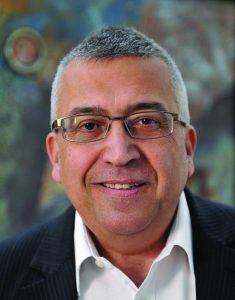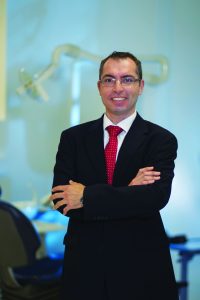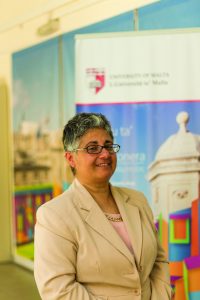John Cordina talks to RIDT CEO Wilfred Kenely, Prof. Nikolai Attard, and Dr JosAnn Cutajar about the University of Malta’s outreach efforts, and working with various sectors of the public in University research.
T
he University of Malta’s contribution to society goes beyond educating thousands of students each year. The University is also a crucial part of the country’s research infrastructure and socio-economic growth. But Maltese expenditure on research and innovation remains far below the EU average.
There has been progress, observes Wilfred Kenely (CEO, Research, Innovation and Development Trust, RIDT). The UoM’s research portfolio has increased dramatically in recent years, and its research infrastructure has been boosted through the investment of millions of euros of mostly EU funds. Despite the investment, it is not enough. But, Kenely adds that this has created the need for new revenue streams, ‘particularly streams coming from the community itself: industry, individuals, alumni, NGOs, and so on.’
Since it was set up, the trust has brought in over €1 million in funds for UoM research, with NGOs alone donating over €200,000.
The UoM established the research trust (RIDT) in 2011 specifically to attract community funding, with the government allocating €500,000 in seed capital to set the ball rolling. The trust is an independent entity with the UoM as its sole beneficiary.
The trust, Kenely explains, encourages philanthropy and corporate social responsibility directed at research. It engages with various sectors of society through the organisation of various fundraising events and initiatives, such as concerts and festivals. Kenely encourages the investment in research in order for the problems of tomorrow to be solved, be they ICT solutions or debilitating diseases. Universities across the world benefit from financial endowments—alumni are typical donors—but the concept is new to Malta, and persuading the public ‘that research needs the support of the community’ has been the biggest challenge’ faced by the RIDT, according to Kenely.
Despite the hurdle ‘we [the research trust] have managed, in a relatively short time, to make significant breakthroughs […] we have an ever-increasing number of donors who are supporting us in a wide range of subjects.’ Since it was set up, the trust has brought in over €1 million in funds for UoM research, with NGOs alone donating over €200,000.
Among other things, this funding has helped finance three PhD scholarships—two in breast cancer research, funded by the Action for Breast Cancer Foundation, and one in climate change research—with a fourth one expected to start shortly. The LifeCycle Foundation is financing research into kidney disease, while the Malta Community Chest Fund is focusing on the genetics of osteoporosis—a bone-weakening disease.
The concept of community-funded research has taken root, though Kenely emphasises the need to build on this trend. ‘What has been accomplished so far is only the beginning; there is a lot more that can be achieved.’
The travelling dentists
The RIDT’s most visible accomplishment is a dental clinic on wheels that has been touring the country since its launch last September. The mobile dental clinic is the brainchild of Prof. Nikolai Attard (Dean, Faculty of Dental Surgery, UoM), who collaborated closely with paediatric dentist Gabriella Gatt on the project.
In 2012, RIDT helped attract funders but a ready-made mobile clinic proved too expensive. Instead the team converted a cargo truck into a mobile clinic with the help of engineer Albert Bonnici. This project still required some €130,000, however, and raising the funds, Attard explains, was no easy task. Kenely’s efforts proved instrumental, attracting donations—primarily from companies operating in the health sector—that helped finish the clinic in three years.
The trigger for the dental clinic was research showing that dental care was not reaching all communities in Malta—not everyone was regularly undergoing dental checkups. ‘This could be for various reasons, including mobility problems, lack of time, difficulty in making an appointment […] so I thought that if people were not coming to us, we should bring the service to them,’ notes Kenely.
And that is just what the clinic is doing. At least twice a week, the mobile clinic visits schools, local councils, associations, day care centres, or festivals, to provide free screening and oral health advice to various members of the public. Dental students supervised by academic staff operate the clinic. So in this way, the clinic plays a double role, training the next generation of dentists while providing dental care to the public. This community engagement could even change how the Faculty organises its courses.
However, Attard emphasises that the clinic is also an invaluable research tool. Engaging the public has also contributed to research that takes the form of data gathering which is collected while the clinic is doing its visits. This forms part of a National Oral Health Survey. The information gathered will serve to help identify the challenges and barriers in dental health care—and research can then weave these strands into a solution.
A bridge to Cottonera
Over 12,500 students attend the UoM, but few students come from the Southern Harbour area of Malta. To change this situation the Rector, Prof. Juanito Camilleri, pushed forward the Cottonera Resource Centre in 2013.
Sociology lecturer, Dr JosAnn Cutajar, was carrying out a study on Cottonera when the centre was being planned. She was made its director. Trying to increase university student numbers from this area is not straightforward.
‘You discover that you cannot simply work on education, you have to work on multiple issues at once, as any one of them can make a student veer off course,’ she states. In order to tackle this issue, the Centre offers free counselling services and a legal clinic.
Many students end up falling behind when they start secondary school because they might shift from a teacher who knew them well to simply being one of many; ‘the loss of a human touch’ certainly does not help. The resource centre’s mentoring project seeks to bring this human touch back. Promising students who might be in need of support are assigned mentors. University students meet them on a regular basis, and take them on educational and social outings. Revision classes in English, Maltese, Mathematics, and Physics are offered to Form 4 (14-year-old secondary) students to help them pass their SEC exams building blocks for eventual entry into university. On the other hand, a STEAM (science, technology, engineering, art, and mathematics) summer school helps younger students engage with the subjects in an inspiring way, encouraging them to adopt a science career.

Prof. Juanito Camilleri at the inauguration of the Cottonera Resource Centre in 2013. Photo by
Tufigno Photo & Video Services
But the Centre also wants to reach adults. Parents influence their children greatly. Public lectures are regularly organised, and the Centre targets the community through specially designed courses, such as one on Holy Week and other religious studies. ‘The course has proved inspiring,’ Cutajar points out, adding how it has shown how people can contribute even if they never thought themselves capable.
Progress has been slow. ‘Success is not achieved by everyone’, notes Cutajar, ‘and the failures can be discouraging’. But positive feedback has come through: those students in revision classes who pass a subject for the first time, or teachers remarking that mentored students have regained their enthusiasm for learning. ‘It’s a slow process but it has its satisfactions.’








